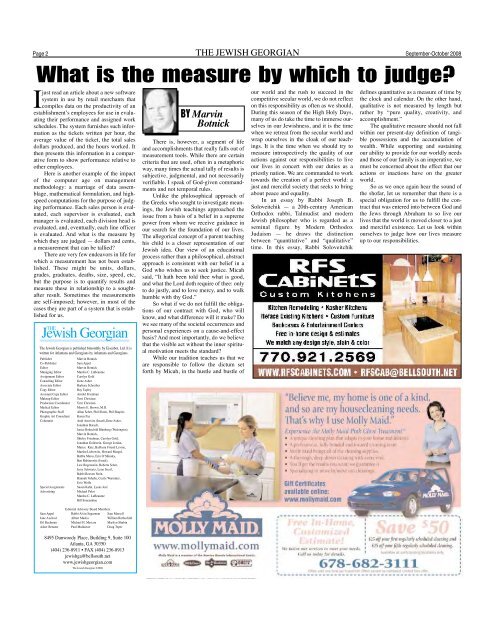You also want an ePaper? Increase the reach of your titles
YUMPU automatically turns print PDFs into web optimized ePapers that Google loves.
Page 2 THE JEWISH GEORGIAN September-October 20<strong>08</strong><br />
What is the measure by which to judge?<br />
I<br />
just read an article about a new software<br />
system in use by retail merchants that<br />
compiles data on the productivity of an<br />
establishment’s employees for use in evaluating<br />
their performance and assigned work<br />
schedules. <strong>The</strong> system furnishes such information<br />
as the tickets written per hour, the<br />
average value of the ticket, the total sales<br />
dollars produced, and the hours worked. It<br />
then presents this information in a comparative<br />
form to show performance relative to<br />
other employees.<br />
Here is another example of the impact<br />
of the computer age on management<br />
methodology: a marriage of data assemblage,<br />
mathematical formulation, and highspeed<br />
computations for the purpose of judging<br />
performance. Each sales person is evaluated,<br />
each supervisor is evaluated, each<br />
manager is evaluated, each division head is<br />
evaluated, and, eventually, each line officer<br />
is evaluated. And what is the measure by<br />
which they are judged — dollars and cents,<br />
a measurement that can be tallied?<br />
<strong>The</strong>re are very few endeavors in life for<br />
which a measurement has not been established.<br />
<strong>The</strong>se might be units, dollars,<br />
grades, graduates, deaths, size, speed, etc,<br />
but the purpose is to quantify results and<br />
measure these in relationship to a soughtafter<br />
result. Sometimes the measurements<br />
are self-imposed; however, in most of the<br />
cases they are part of a system that is established<br />
for us.<br />
THE<br />
<strong>Jewish</strong> <strong>Georgian</strong><br />
<strong>The</strong> <strong>Jewish</strong> <strong>Georgian</strong> is published bimonthly by Eisenbot, Ltd. It is<br />
written for Atlantans and <strong>Georgian</strong>s by Atlantans and <strong>Georgian</strong>s.<br />
Publisher Marvin Botnick<br />
Co-Publisher Sam Appel<br />
Editor Marvin Botnick<br />
Managing Editor Marsha C. LaBeaume<br />
Assignment Editor Carolyn Gold<br />
Consulting Editor Gene Asher<br />
Associate Editor Barbara Schreiber<br />
Copy Editor Ray Tapley<br />
Assistant Copy Editor Arnold Friedman<br />
Makeup Editor Terri Christian<br />
Production Coordinator Terri Christian<br />
Medical Editor Morris E. Brown, M.D.<br />
Photographic Staff Allan Scher, Phil Slotin, Phil Shapiro<br />
Graphic Art Consultant Karen Paz<br />
Columnist Andi Arnovitz (Israel),Gene Asher,<br />
Jonathan Barach,<br />
Janice Rothschild Blumberg (Washington),<br />
Marvin Botnick,<br />
Shirley Friedman, Carolyn Gold,<br />
Jonathan Goldstein, George Jordan,<br />
Marice Katz, Balfoura Friend Levine,<br />
Marsha Liebowitz, Howard Margol,<br />
Bubba Meisa, Erin O’Shinsky,<br />
Ben Rabinowitz (Israel),<br />
Lew Regenstein, Roberta Scher,<br />
Jerry Schwartz, Leon Socol,<br />
Rabbi Reuven Stein,<br />
Hannah Vahaba, Cecile Waronker,<br />
Evie Wolfe<br />
Special Assignments Susan Kahn, Lyons Joel<br />
Advertising Michael Pelot<br />
Marsha C. LaBeaume<br />
Bill Sonenshine<br />
Editorial Advisory Board Members<br />
Sam Appel Rabbi Alvin Sugarman Sam Massell<br />
Jane Axelrod Albert Maslia William Rothschild<br />
Gil Bachman Michael H. Mescon Marilyn Shubin<br />
Asher Benator Paul Muldawer Doug Teper<br />
8495 Dunwoody Place, Building 9, Suite 100<br />
Atlanta, GA 30350<br />
(404) 236-8911 • FAX (404) 236-8913<br />
jewishga@bellsouth.net<br />
www.jewishgeorgian.com<br />
<strong>The</strong> <strong>Jewish</strong> <strong>Georgian</strong> ©20<strong>08</strong><br />
BY Marvin<br />
Botnick<br />
<strong>The</strong>re is, however, a segment of life<br />
and accomplishments that really falls out of<br />
measurement tools. While there are certain<br />
criteria that are used, often in a metaphoric<br />
way, many times the actual tally of results is<br />
subjective, judgmental, and not necessarily<br />
verifiable. I speak of God-given commandments<br />
and not temporal rules.<br />
Unlike the philosophical approach of<br />
the Greeks who sought to investigate meanings,<br />
the <strong>Jewish</strong> teachings approached the<br />
issue from a basis of a belief in a supreme<br />
power from whom we receive guidance in<br />
our search for the foundation of our lives.<br />
<strong>The</strong> allegorical concept of a parent teaching<br />
his child is a closer representation of our<br />
<strong>Jewish</strong> idea. Our view of an educational<br />
process rather than a philosophical, abstract<br />
approach is consistent with our belief in a<br />
God who wishes us to seek justice. Micah<br />
said, “It hath been told thee what is good,<br />
and what the Lord doth require of thee: only<br />
to do justly, and to love mercy, and to walk<br />
humble with thy God.”<br />
So what if we do not fulfill the obligations<br />
of our contract with God, who will<br />
know, and what difference will it make? Do<br />
we see many of the societal occurrences and<br />
personal experiences on a cause-and-effect<br />
basis? And most importantly, do we believe<br />
that the visible act without the inner spiritual<br />
motivation meets the standard?<br />
While our tradition teaches us that we<br />
are responsible to follow the dictum set<br />
forth by Micah, in the hustle and bustle of<br />
our world and the rush to succeed in the<br />
competitive secular world, we do not reflect<br />
on this responsibility as often as we should.<br />
During this season of the High Holy Days,<br />
many of us do take the time to immerse ourselves<br />
in our <strong>Jewish</strong>ness, and it is the time<br />
when we retreat from the secular world and<br />
wrap ourselves in the cloak of our teachings.<br />
It is the time when we should try to<br />
measure introspectively the quality of our<br />
actions against our responsibilities to live<br />
our lives in concert with our duties as a<br />
priestly nation. We are commanded to work<br />
towards the creation of a perfect world: a<br />
just and merciful society that seeks to bring<br />
about peace and equality.<br />
In an essay by Rabbi Joseph B.<br />
Soloveitchik — a 20th-century American<br />
Orthodox rabbi, Talmudist and modern<br />
<strong>Jewish</strong> philosopher who is regarded as a<br />
seminal figure by Modern Orthodox<br />
Judaism — he draws the distinction<br />
between “quantitative” and “qualitative”<br />
time. In this essay, Rabbi Soloveitchik<br />
defines quantitative as a measure of time by<br />
the clock and calendar. On the other hand,<br />
qualitative is not measured by length but<br />
rather by “pure quality, creativity, and<br />
accomplishment.”<br />
<strong>The</strong> qualitative measure should not fall<br />
within our present-day definition of tangible<br />
possessions and the accumulation of<br />
wealth. While supporting and sustaining<br />
our ability to provide for our worldly needs<br />
and those of our family is an imperative, we<br />
must be concerned about the effect that our<br />
actions or inactions have on the greater<br />
world.<br />
So as we once again hear the sound of<br />
the shofar, let us remember that there is a<br />
special obligation for us to fulfill the contract<br />
that was entered into between God and<br />
the Jews through Abraham to so live our<br />
lives that the world is moved closer to a just<br />
and merciful existence. Let us look within<br />
ourselves to judge how our lives measure<br />
up to our responsibilities.
















